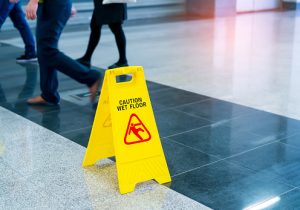 High-profile slip, trip and fall accidents are publicized when customers suffer injuries on a business premises in California. But what about the workers?
High-profile slip, trip and fall accidents are publicized when customers suffer injuries on a business premises in California. But what about the workers?
Work-related falls may not garner as much attention as patron accidents do because workers' compensation benefits don't cover other damages such as pain and suffering or punitive penalties, the way personal injury claims can. But the injuries sustained can be equally devastating.
In terms of work-related injuries, the Occupational Safety and Health Administration (OSHA) reports falls account for 39 percent of all construction industry deaths, and a significant number of injuries.
While those injured in non-work-related slip-and-falls must prove negligence, workers' compensation is a no-fault system. You don't have to prove that the floors were uneven or someone failed to do their job in cleaning up a slippery mess. Workers just need to prove the injury occurred during the course and scope of their employment, in alignment with Department of Industrial Relations regulations and California Labor Code.
Your employer may be responsible for preventing workplace falls
It's better, of course, to prevent such falls if at all possible, which starts with employers. Some preventive methods suggested by EHS Today include:
- Formal safety audits. Federal statute 29 CFR 1910.22(d)(1) makes it clear that while safety audits aren't technically required, floors and other walking surfaces are to be inspected regularly.
- Incident report reviews. If your workplace has had several recent falls, it's worth examining whether there is a pattern that needs to be addressed. Left unchecked, there may be a recurrence that might result in a finding of "gross negligence," which could lead to additional damages awarded to the worker.
- Liquid trail inspections. If you have transport of liquids regularly through any part of your business - say from a self-serve drink fountain to the dining area or in front of a cooler to the grocery store aisle - these are foreseeable hazards that workplaces have a responsibility to address to keep walking surfaces safe.
- Employee "hazard-finding" contest. A company's workers are often the best resources to uncover safety hazards. They know which walking surfaces aren't even and which they must be especially careful not to slip on.
- Vendor input. Floor care companies are eager to show off what their product can do if it means a new top-line industrial customer. Asking for their input can be helpful.
Work-related slip-and-falls should be reported immediately to supervisors. Workers whose claims are denied are often best-served by the assistance of an experienced San Diego workers' compensation attorney. Contact the McLaughlin & Sanchez today and find out how we can help.
